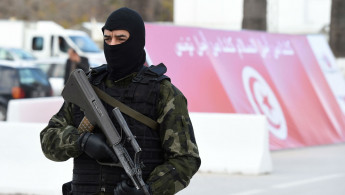Tunisia takes on extremism with new 'terrorism' strategy
A new strategy to fight "terrorism and extremism" was adopted by Tunisia's national security council on Monday, two days after the Islamic State group said it had killed a soldier.
No details were provided about the plan, but the presidency said it had been discussed with members of civil society during its preparation and by government ministers and security top brass.
In a statement the presidency said the "national strategy to fight against extremism and terrorism" is built around the four main axes of "prevention, protection, judicial proceedings and retaliation".
The national security council is headed by Tunisia's President Beji Caid Essebsi.
Tunisia has experienced a rise in religious extremism since the 2011 revolution that overthrew former president, Zine El Abidine Ben Ali.
Clashes have escalated between security forces and a militant movement responsible for killing dozens of soldiers and police officers, as well as civilians including 59 foreign tourists.
On Sunday, the Islamic State group claimed the killing of a Tunisian soldier who was found dead in his home.
The man was killed in a central region of the country that is a major hideout for militant groups.
"A Tunisian soldier was assassinated in his home yesterday at the hands of Islamic State fighters in Mount Mghilla," the IS-affiliated Amaq news agency said.
It identified the soldier via an ID card posted online including his name and rank which shows he was in the air force.
Army and national guard units had launched a search for the attackers, defence ministry spokesman Belhassen Oueslati said but no official statement was made.
 |
The country has been under a state of emergency since a string of deadly attacks in 2015, claimed by groups affiliated with IS and al-Qaeda in the Islamic Maghreb (AQIM). |  |
In late October, at least three soldiers were killed and six others wounded in a blast targeting their vehicle near Tunisia's Mount Sammama, a hideout for extremists at war with the authorities.
The country has been under a state of emergency since a string of deadly attacks in 2015, claimed by groups affiliated with IS and al-Qaeda in the Islamic Maghreb (AQIM).
IS carried out three major attacks on Tunisian soil in 2015, killing 72 people.
In March 2015, militants killed 21 tourists and a policeman at the National Bardo Museum in Tunis.
The following month, 30 Britons were among 38 foreign holidaymakers killed in a gun and grenade attack on a beach resort near the Tunisian city of Sousse.
That November, a suicide bombing in the capital killed 12 members of the presidential guard.
Authorities responded by declaring a state of emergency and a curfew in Tunis. The curfew was later lifted, but the state of emergency has remained in place.
In March, dozens of militants attacked security installations in the town of Ben Guerdane on the border with Libya, killing 13 members of the security forces.
Seven civilians and 55 extremists were killed, according to an official toll.
Meanwhile, several thousand Tunisians have travelled abroad to join militant groups in Iraq, Syria and Libya and become the largest contingent of foreign fighters for IS.





 Follow the Middle East's top stories in English at The New Arab on Google News
Follow the Middle East's top stories in English at The New Arab on Google News
![Israeli forces ordered bombed Gaza's Jabalia, ordering residents to leave [Getty]](/sites/default/files/styles/image_330x185/public/2176418030.jpeg?h=a5f2f23a&itok=_YGZaP1z)

